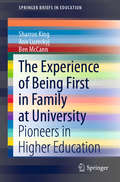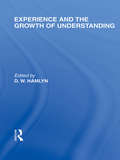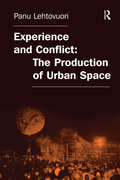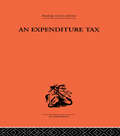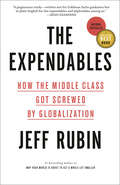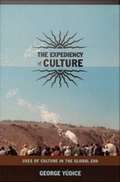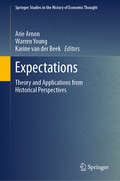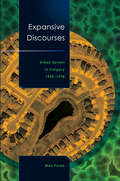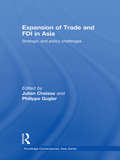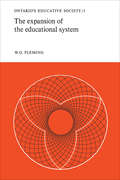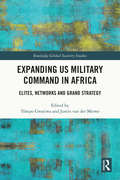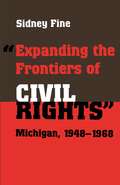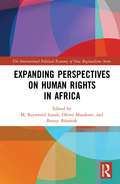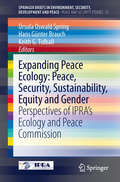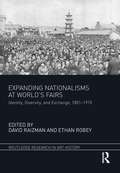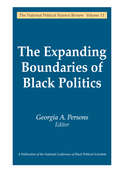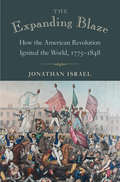- Table View
- List View
The Experience of Being First in Family at University: Pioneers in Higher Education (SpringerBriefs in Education)
by Sharron King Ann Luzeckyj Ben McCannThis book provides an in-depth analysis of what it means to be the first in family at university. It examines the factors that influence first in family students' decisions to enrol, attend and continue at university, and how their hopes, dreams and ambitions for the future affect their university experience. Using survey data and semi-structured interviews, the book offers valuable and far-reaching insights into the first in family student experience, and provides recommendations for future practice at the national and institutional level for teaching and professional staff as well as for first in family students. As universities face intense competition for students and growing economic constraints due to funding cuts and increasing costs, this book comes at a critical time.
Experience and the growth of understanding (International Library of the Philosophy of Education Volume 11)
by D.W. HamlynThis volume examines some of the arguments that have been put forward over the years to explain the way in which understanding is acquired. The author looks firstly at the empricist thesis of genesis without structure, and secondly at the opposing theory, represented by Chomsky of structure without genesis. His greatest sympathy is with the theory of Piaget, who represents structure with genesis. He considers that Piaget's account is flawed, however, by its biological model and by its failure to deal adequately with the problem of objectivity. The second part of the book contains chapters on language, the differences between early and later learning, and on teaching. The book provides a general understanding of the principles that make it possible, and the differences between the ways in which they work at different stages.
Experience and Conflict: The Dialectics Of The Production Of Public Urban Space In The Light Of New Event Venues In Helsinki 1993-2003
by Panu LehtovuoriWhen designing, planning and building urban spaces, many contradictory and conflicting actors, practices and agendas coexist. This book propounds that, at present, this process is conducted in an artificial reality, 'Concept City', characterized by a simplified and outdated conception of space. It provides a constructive critique of the concepts, underlying the practices of planning and architecture and, in order to facilitate more dynamic, inclusive and subtle practices, it formulates a new theory about space in general and public urban space in particular. The central notions in this theory are temporality, experiment and conflict, which are grounded on empirical observations in Helsinki, Manchester and Berlin. While the book contextualizes Lefebvre's ideas on urban planning and architecture, it is in no way limited to Lefebvrean discourse, but allows insights to new theoretical work, including that of Finnish and Swedish authors. In doing so, it suggests and develops exciting new approaches and tools leading to 'experiential urbanism'.
Expenditure Tax (Modern Revivals In Economics Ser.)
by Nicholas Kaldor'This is one of those rare technical books which has an importance outside its own field' The Daily Telegraph.'One of the most stimulating post-war books on public finance' The Guardian.Part 1 examines the issue of Expenditure Tax in principle and includes chapters on the following:* Income, Expenditure and Taxable Capacity* The Concept of Income in Economic Theory* Taxation and Savings* Taxation and risk-bearing* Taxation and the Incentive to Work* Company Taxation* Taxation and Economic ProgressPart 2 examines the issue of Expenditure Tax in practice, asking whether personal expenditure tax is practicable and putting forward a proposal for Surtax Reform.
The Expendables: How the Middle Class Got Screwed By Globalization
by Jeff RubinFrom the #1 bestselling author of Why Your World Is About to Get A Whole Lot Smaller, a provocative, far-reaching account of how the middle class got stuck with the bill for globalization, and how the blowback--from Brexit to Trump to populist Europe--will change the developed world.Real wages in North America have not risen since the 1970s. Union membership has collapsed. Full-time employment is beginning to look like a quaint idea from the distant past. If it seems that the middle class is in retreat around the developed world, it is. Former CIBC World Markets Chief Economist Jeff Rubin argues that all this was foreseeable back when Canada, the United States and Mexico first started talking free trade. Labour argued then that manufacturing jobs would move to Mexico. Free-trade advocates disagreed. Today, Canadian and American factories sit idle. More steel is used to make bottlecaps than cars. Meanwhile, Mexico has become one of the world's biggest automotive exporters. And it's not just NAFTA. Cheap oil, low interest rates, global deregulation and tax policies that benefit the rich all have the same effect: the erosion of the middle class. Growing global inequality is a problem of our own making, Rubin argues. And solving it won't be easy if we draw on the same ideas about capital and labour, right and left, that led us to this cliff. Articulating a vision that dovetails with the ideas of both Naomi Klein and Donald Trump, The Expendables is an exhilaratingly fresh perspective that is at once humane and irascible, fearless and rigorous, and most importantly, timely. GDP is growing, the stock market is up and unemployment is down, but the surprise of the book is that even the good news is good for only one percent of us.
The Expedition to the Baobab Tree
by J. M. Coetzee Wilma StockenstromLearning to survive in the harsh interior of Southern Africa, a former slave seeks shelter in the hollow of a baobab tree. For the first time since she was a young girl her time is her own, her body is her own, her thoughts are her own. In solitude, she is finally able to reflect on her own existence and its meaning, bringing her a semblance of inner peace. Scenes from her former life shuttle through her mind: how owner after owner assaulted her, and how each of her babies were taken away as soon as they were weaned, their futures left to her imagination. We are the sole witnesses to her history: her capture as a child, her tortured days in a harbor city on the eastern coast as a servant, her journey with her last owner and protector, her flight, and the kaleidoscopic world of her baobab tree. Wilma Stockenström's profound work of narrative fiction, translated by Nobel Prize winner J.M. Coetzee, is a rare, haunting exploration of enslavement and freedom. From the Trade Paperback edition.
The Expediency of Culture: Uses of Culture in the Global Era
by George YúdiceThe Expediency of Culture is a pioneering theorization of the changing role of culture in an increasingly globalized world. George Ydice explores critically how groups ranging from indigenous activists to nation-states to nongovernmental organizations have all come to see culture as a valuable resource to be invested in, contested, and used for varied sociopolitical and economic ends. Through a dazzling series of illustrative studies, Ydice challenges the Gramscian notion of cultural struggle for hegemony and instead develops an understanding of culture where cultural agency at every level is negotiated within globalized contexts dominated by the active management and administration of culture. He describes a world where "high" culture (such as the Guggenheim Museum in Bilbao, Spain) is a mode of urban development, rituals and everyday aesthetic practices are mobilized to promote tourism and the heritage industries, and mass culture industries comprise significant portions of a number of countries' gross national products. Ydice contends that a new international division of cultural labor has emerged, combining local difference with transnational administration and investment. This does not mean that today's increasingly transnational culture--exemplified by the entertainment industries and the so-called global civil society of nongovernmental organizations--is necessarily homogenized. He demonstrates that national and regional differences are still functional, shaping the meaning of phenomena from pop songs to antiracist activism. Ydice considers a range of sites where identity politics and cultural agency are negotiated in the face of powerful transnational forces. He analyzes appropriations of American funk music as well as a citizen action initiative in Rio de Janeiro to show how global notions such as cultural difference are deployed within specific social fields. He provides a political and cultural economy of a vast and increasingly influential art event-- insite a triennial festival extending from San Diego to Tijuana. He also reflects on the city of Miami as one of a number of transnational "cultural corridors" and on the uses of culture in an unstable world where censorship and terrorist acts interrupt the usual channels of capitalist and artistic flows.
Expectations: Theory and Applications from Historical Perspectives (Springer Studies in the History of Economic Thought #Vol. 65)
by Arie Arnon Warren Young Karine van der BeekThis book provides a unique historical perspective on expectations in economic theory, and applications of expectations models in economic history. Based on papers presented at the 2017 Thomas Guggenheim Conference, it brings together the work of economists, historians of economics, and economic historians on issues and events concerning expectations in economics and economic history. The contributions address: (i) the history of expectations models; (ii) growth, expectations and political economy; (iii) controversies regarding expectations methods and models; (iv) expectations in theory and reality; and (v) expectations in economic history. The book opens with a lecture by Thomas Guggenheim Prize winner Duncan Foley on the evolution of expectations in modern economic thought. The remaining content is divided into two parts, the first of which focuses on the utilization of expectations in the “ancient” and “meso” periods of high theory, i.e., from Smithian to Keynesian approaches. The papers cover topics such as “modern” applications of expectations in both “Tobinesque-Phillips” and “Harrodian-Solowian” contexts, and the debate between Friedmanite and Keynesian approaches to expectation formation. In turn, the last part presents essays on the role of economic expectations in connection with historical events and contexts, ranging from the early 20th century to World War II, and on the application of expectations theory to hyperinflation and stabilization, taking Israel as a case study.
Expatriates: A Novel of the Coming Global Collapse
by James Wesley RawlesIn the latest survivalist thriller from founder of survivalblog. com and New York Times bestselling author James Wesley, Rawles, two expat families struggle for their very survival in the midst of a global economic collapse. When the United States suffers a major socioeconomic collapse, a power vacuum sweeps the globe. A newly radicalized Islamic government rises to power in Indonesia, invades the Philippines, East Timor, Papua New Guinea, and finally northern Australia. No longer protected by American military interests, Australia must repel an invasion alone. In the thick of these political maneuvers, an American family of missionaries living in the Philippines and a Texan petroleum engineer in Australia must face the fear of being strangers in a world in flux. Are their relatives back home healthy and safe? Will they ever see them again? In its depiction of the authentic survivalist skills and techniques needed to survive a global socioeconomic meltdown, Expatriates is as informative as it is suspense-filled.
Expansive Discourses: Urban Sprawl in Calgary, 1945-1978
by Max ForanThis is a groundbreaking study of urban sprawl in Calgary after theSecond World War. The interactions of land developers and the localgovernment influenced how the pattern grew: developers met marketdemands and optimized profits by building houses as efficiently aspossible, while the city had to consider wider planning constraints andinfrastructure costs. Foran examines the complexity of theirinteractions from a historical perspective, why each party acted as itdid, and where each can be criticized.
Expansionism: Its Effects on Cuba's Independence
by Frank R. VillafañaStarting in the early part of the nineteenth century, American administrations expressed a desire to own Cuba. A rationale for adding Cuba to the territory of the United States could be built on Cuba's sugar and tobacco industries, as well as Cuba's mineral deposits. But economics was not the primary motivation. American presidents knew that in the event of war, any nation occupying Cuba would have an advantage over the US military strategies; this fear, coupled with the economic benefit, explains a century of policy decisions. As Frank R. Villafana shows, Cubans were not sitting idle, waiting for outsiders to liberate them from Spanish oppression. A major part of this research is devoted to studying Cuban efforts to liberate their island from prolonged Spanish domination. Cuba had been struggling for independence from Spain since the 1830s, followed by the Ten Year War. During the 1895-1898 War of Independence, Cuba came close to defeating Spain, but a merciless Spanish military effort converted Cuba into a series of concentration camps. Spain surrendered after its naval defeats by the US at Manila Bay and Santiago de Cuba, following a failed ground campaign in eastern Cuba. After the US occupied Cuba militarily, American political leaders realized only a small minority of Cubans supported annexation, and the Platt Amendment was developed as a substitute. Today, most Cubans agree that independence, even constrained by the United States, was better than enslavement by the Castro brothers. However, as Villafana emphasizes, Cubans living in Cuba as well as abroad still seek a land free and independent of foreign threat and domestic tyrants.
Expansionary Fiscal Contraction
by Duncan Needham Anthony HotsonIn its 1981 Budget, the Thatcher government discarded Keynesian counter-cyclical policies and cut Britain's public sector deficit in the depths of the worst UK recession since the 1930s. Controversially, the government argued that fiscal contraction would produce economic growth. In this specially commissioned volume, contributors examine recently released archives alongside firsthand accounts from key players within No. 10 Downing Street, HM Treasury and the Bank of England, to provide the first comprehensive treatment of this critical event in British economic history. They assess the empirical and theoretical basis for expansionary fiscal contraction, drawing clear parallels with contemporary debates on austerity in Europe, USA and Japan in the wake of the recent global financial crisis. This timely and thoughtful book will have broad appeal among economists, political scientists, historians and policy makers.
Expansion of Trade and FDI in Asia: Strategic and Policy Challenges (Routledge Contemporary Asia Series)
by Julien Chaisse Philippe GuglerForeign direct investment flows have increased dramatically in recent decades and continue to be a driving factor of economic globalisation. As a growth pole in the world economy, large parts of Asia have particularly become an attractive place for market-seeking FDI. In a high number of Asian countries FDI restrictions have been reduced, leading to accelerated technological exchange and globally integrated production and marketing networks. Overall, this has positively benefited the emerging countries that have opened their doors to FDI. Expansion of Trade and FDI in Asia explores the trends of present FDI in Asia and their effects on multilateral regulation of FDI. It reviews the increasing attraction of FDI and the rise of Asian transnational corporations (TNCs) from an economic perspective. It also investigates the legal side of the development, in particular the changes in bilateral and regional FDI regulation, and the lessons that could be learned for International Investment Agreements (IIAs) and the constitution of trading blocs. This book will be of interest to postgraduates and academics interested in Asian studies, Asian economics and international economics.
The Expansion of the Educational System: Ontario's Educative Society, Volume I
by W. G. FlemingThis volume contains a general introduction to the whole series, followed by seven chapters giving most of the quantitative information in compact form. The introduction discusses some current issues and problems in education: the economic value of education to the individual and to society, the effects of automation, the role of the school in social and emotional development, vocational training and physical development, and the relationship between education and social class. The main body of the text describes the quantitative growth of the educational system and is organized into seven topics: characteristics of the population, school enrollment, the proliferation of educational institutions, university enrolment, enrolment in other post-secondary institutions, and the financing of the system. It contains much specialized statistical material including 46 charts and 225 tables, and will be an excellent work of reference.
The Expansion Of Europe
by Ramsay MuirA survey of Imperialist Europe, with particular regard to the British Empire.
Expanding US Military Command in Africa: Elites, Networks and Grand Strategy (Routledge Global Security Studies)
by Tshepo Gwatiwa Justin van der MerweThis book discusses the systematic expansion of the United States Africa Command (AFRICOM) across the continent of Africa. This book posits that AFRICOM expansion in Africa is part of a broader system of accumulation based on a government-business-media (GBM) complex. Applying the concept at both structural and descriptive levels, the GBM complex is a function of the synergy between the state’s quest for power, businesses’ need for expansion, and the informational and hegemonic functions of media actors. The United States’ GBM complex in Africa is supported—and in some locations spearheaded—by its military, with dispossessing effects on local actors. Drawing from African case studies, analytical accounts and empirical case studies, this book explores AFRICOM’s role within this broader strategy. The volume maps both the methods and the scope of this expansion, as well as local resistance to this process, and comprises perspectives from the five regions of Africa, key sub-regional organizations and voices from Africa’s regional hegemons. This book will be of much interest to students of security studies, strategic studies, African politics and International Relations.
"Expanding the Frontiers of Civil Rights": Michigan, 1948-1968 (Great Lakes Books Series)
by Sidney FineAlthough historians have devoted a great deal of attention to the development of federal government policy regarding civil rights in the quarter century following World War II, little attention has been paid to the equally important developments at the state level. Few states underwent a more dramatic transformation with regard to civil rights than Michigan did. In 1948, the Michigan Committee on Civil Rights characterized the state of civil rights in Michigan as presenting "an ugly picture." Twenty years later, Michigan was a leader among the states in civil rights legislation. "Expanding the Frontiers of Civil Rights" documents this important shift in state level policy and makes clear that civil rights in Michigan embraced not only blacks but women, the elderly, native Americans, migrant workers, and the physically handicapped.
Expanding Perspectives on Human Rights in Africa (The International Political Economy of New Regionalisms Series)
by M. Raymond Izarali Oliver Masakure Bonny IbhawohThis book draws attention to emerging issues around the rights of minorities, marginalized groups, and persons in Africa. It explores the gaps between human rights provisions and conditions, showing that although international human rights principles have been embraced in the continent, various minority groups and marginalized persons are denied such rights through criminalization and persecution. African countries have a good record of signing and ratifying international and regional rights instruments but the political will and capacity for enforcing these with respect to minorities remain weak. International contributors to the book provide new perspectives on the rights of marginalized and minority groups in different parts of Africa and the extent to which they are deprived or denied entitlement to the universality and equality articulated in law. The authors show that human rights, while having come of age as a moral ideal, has not been fully entrenched in practice towards groups such as children, indigenous populations, the mentally ill, persons with disabilities, and persons with albinism. This volume is geared toward scholars, students, human rights groups, policy makers, social workers, international organizations, and policy makers in the fields of criminology, security studies, development studies, political science, sociology, children studies, social psychology, international relations, postcolonial studies, and African Studies.
Expanding Peace Ecology: Peace, Security, Sustainability, Equity and Gender
by Úrsula Oswald Spring Hans Günter Brauch Keith G. TidballThis book has peer-reviewed chapters by scholars from Australia, Canada, Germany, Japan, Mexico and the USA that were presented to the Ecology and Peace Commission (EPC) of the International Peace Research Association (IPRA) in November 2012 in Japan. The chapters address these themes: Expanding Peace Ecology - Peace, Security, Sustainability, Equity and Gender; Two Discourses on Global Climate Change Impacts: From Climate Change and Security to Sustainability Transition; Peace Research and Greening in the Red Zone: Community-based Ecological Restoration to Enhance Resilience and Transitions Toward Peace; Social and Environmental Vulnerability in a River Basin of Mexico; Mobile Learning, Rebuilding Community Through Building Communities, Supporting Community Capacities: Post Natural Disaster Experience; Transforming Consciousness through Peace Environmental Education; Building Peace by Rebuilding Community; Ability Expectations and Peace and on Satoyama Sustainability and Peace.
Expanding Nationalisms at World's Fairs: Identity, Diversity, and Exchange, 1851-1915 (Routledge Research in Art History)
by David Raizman Ethan RobeyExpanding Nationalisms at World’s Fairs: Identity, Diversity, and Exchange, 1851–1915 introduces the subject of international exhibitions to art and design historians and a wider audience as a resource for understanding the broad and varied political meanings of design during a period of rapid industrialization, developing nationalism, imperialism, expanding trade and the emergence of a consumer society. Its chapters, written by both established and emerging scholars, are global in scope, and demonstrate specific networks of communication and exchange among designers, manufacturers, markets and nations on the modern world stage from the second half of the nineteenth century into the beginning of the twentieth. Within the overarching theme of nationalism and internationalism as revealed at world’s fairs, the book’s essays will engage a more complex understanding of ideas of competition and community in an age of emergent industrial capitalism, and will investigate the nuances, contradictions and marginalized voices that lie beneath the surface of unity, progress, and global expansion.
The Expanding Boundaries of Black Politics (National Political Science Review Ser. #Vol. 11)
by Anthony WohlThis volume joins the preceding volumes in this distinguished series in presenting contemporary research by leading political scientists addressing topics of interest to those concerned with African-American affairs. It captures the expanding boundaries of black politics and the persistent interests of the black community at large.The anchoring symposium, ""The Expanding Boundaries of Black Politics,"" presents the scholarship of a cadre of young black political scientists actively engaged in the critical tasks of moving forward the study of black politics. Their concerns include expanding the boundaries of black politics along the lines of epistemology and methodology, especially in regard to core issues and areas within this field. In an introductory essay by Todd Shaw, the work of these scholars is situated within the context of temporal shifts in scholarly emphases. Overlapping issues and concerns across time as well as black political scholarship as defined in the field since its beginning are addressed.The second part of this volume, entitled ""Maximizing the Black Vote; Recognizing the Limits of Electoral Politics,"" concentrates on serious lingering social concerns. These include the policy significance of black mayors affecting the concomitant impact of the black vote, the boundaries being pushed concerning the conjunction of black theology and sexual identity, a gendered analysis of familial policies, and the deepening social and economic plight of young black males including felon disfranchisement.The Expanding Boundaries of Black Politics carries forth the search for an understanding of the relationship between religion, the black church, and black political behavior; cross-racial group coalitions as concerns matters of immigration, growing multiculturalism, and the impact on black politics; maximizing the impact of the black vote focusing on voting rights enforcement, the black vote in presidential elections, and the voice of the Congressional Black Caucus
The Expanding Blaze: How the American Revolution Ignited the World, 1775-1848
by Jonathan IsraelA major intellectual history of the American Revolution and its influence on later revolutions in Europe and the AmericasThe Expanding Blaze is a sweeping history of how the American Revolution inspired revolutions throughout Europe and the Atlantic world in the eighteenth and nineteenth centuries. Jonathan Israel, one of the world’s leading historians of the Enlightenment, shows how the radical ideas of American founders such as Paine, Jefferson, Franklin, Madison, and Monroe set the pattern for democratic revolutions, movements, and constitutions in France, Britain, Ireland, the Netherlands, Belgium, Poland, Greece, Canada, Haiti, Brazil, and Spanish America.The Expanding Blaze reminds us that the American Revolution was an astonishingly radical event—and that it didn’t end with the transformation and independence of America. Rather, the Revolution continued to reverberate in Europe and the Americas for the next three-quarters of a century. This comprehensive history of the Revolution’s international influence traces how American efforts to implement Radical Enlightenment ideas—including the destruction of the old regime and the promotion of democratic republicanism, self-government, and liberty—helped drive revolutions abroad, as foreign leaders explicitly followed the American example and espoused American democratic values.The first major new intellectual history of the age of democratic revolution in decades, The Expanding Blaze returns the American Revolution to its global context.
Expanding Access to Health Care: A Management Approach (Transformational Trends In Governance And Democracy Ser.)
by Terry F. Buss Paul N. Van de WaterThe U.S. health care system faces well-known problems: 47 million people without health insurance, rapidly rising costs that consume 16 percent of the country's economic output, and widely uneven quality of care. Even many people with coverage are experiencing serious problems paying for the rapidly rising costs of health care and insurance.This book - a joint product of the National Academy of Public Administration and the National Academy of Social Science - undertakes a sweeping analysis of the management and administrative issues that arise in expanding health care coverage. The book identifies the core administrative functions that need to be performed in assuring access to health coverage, describes how these functions are performed at present and under proposed alternatives, draws lessons from experience in the U.S. and abroad, and assesses suggested administrative approaches designed to facilitate the improvement and expansion of health care coverage.Adequate health care is one of today's most crucial domestic policy concerns. "Expanding Access to Health Care" is designed to bring together in one place some of the best thinking on the subject, not as an exercise in advocacy, but rather to lay out the issues in a balanced way so that policymakers, researchers, and citizens can better understand the complex details of health care reform.
Expand Social Security Now!
by Steven HillWhy Social Security is not only sustainable but should be substantially expandedSocial Security is bankrupting us. It's outdated. It's a Ponzi scheme. It's stealing from young people. These are some of the biggest myths and lies about one of the most successful programs in our nation's history. Three-quarters of Americans depend heavily on Social Security in their elderly years and nearly half would be living in poverty without it. But as important and popular as it is, Social Security has become a political football. A well-financed campaign--supported by conservatives, special interest groups, and even leading Democrats--has lobbied for cuts and significant "entitlement reform," falsely proclaiming that Social Security is going broke. Policy expert Steven Hill argues that Social Security should not only be defended, it should be substantially expanded. Here he proposes how we can double the monthly benefit and how to pay for it by closing many of the tax loopholes and deductions that disproportionately favor the wealthy few.From the Trade Paperback edition.
Exorcising Terror: The Incredible Unending Trial of General Augusto Pinochet (Open Media Series)
by Ariel DorfmanRenowned author Ariel Dorfman, obsessed for twenty-five years with the malignant shadow General Pinochet cast upon Chile and the world, followed every twist and turn of the four year old trial in Great Britain, Spain and Chile as well as in the U.S., the country that had created Pinochet. Told as a suspense thriller, filled with court-room drama and sudden reversals of fortune, the book at the same time addresses some of today's most burning issues, made all the more urgent after the terrorist attacks of September 11th 2001. What are the limits of national sovereignty in a globalizing world? How does an ever more interconnected world judge crimes committed against humanity? What role do memory and pain and the rights of the survivors play in this struggle for a new system of justice? But above all, the author, by listening carefully to the voices of Pinochet's many victims, explores how can we purge ourselves of terror and fear once we have been traumatized, and asks if we can build peace and reconciliation without facing a turbulent and perverse past.
